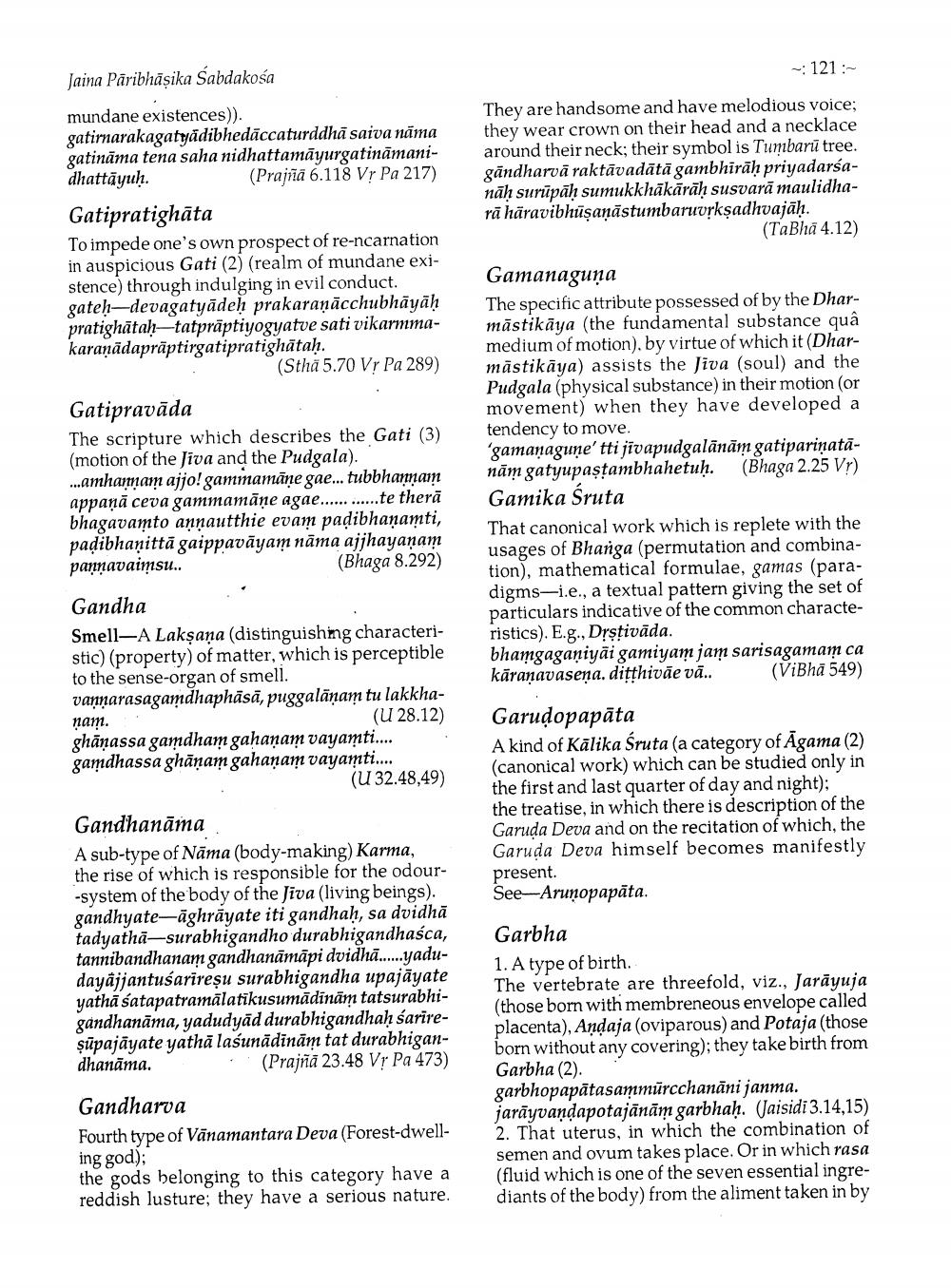________________
Jaina Pāribhāșika Sabdakośa
121:
mundane existences)). gatirnarakagatyádibhedāccaturddhā saiva näma gatināma tena saha nidhattamāyurgatināmanidhattāyuḥ.
(Prajna 6.118 Vr Pa 217).
They are handsome and have melodious voice; they wear crown on their head and a necklace around their neck; their symbol is Tumbarū tree. gandharvā raktāvadātā gambhirah priyadarsanāh surūpāh sumukkhākārāḥ susvarā maulidharā hāravibhūsaņāstumbaruvíkşadhvajāḥ.
(Tabha 4.12)
Gatipratighāta To impede one's own prospect of re-ncarnation in auspicious Gati (2) (realm of mundane existence) through indulging in evil conduct. gateh-devagatyādeh prakaranācchubhāyāh pratighātah-tatprāptiyogyatve sati vikarmmakaraṇādaprāptirgatipratighātaḥ.
(Stha 5.70 Vr Pa 289)
Gatipravāda The scripture which describes the Gati (3) (motion of the Jiva and the Pudgala). ...amhamnam ajjo! gammamāne gae... tubbhannam appaņā ceva gammamāne agae............te therā bhagavamto annautthie evam padibhanamti, padibhaạittā gaippavāyam nāma ajjhayaņam pannavaimsu..
(Bhaga 8.292)
Gamanaguņa The specific attribute possessed of by the Dharmāstikāya (the fundamental substance quâ medium of motion), by virtue of which it (Dharmāstikāya) assists the Jiva (soul) and the Pudgala (physical substance) in their motion (or movement) when they have developed a tendency to move. 'gamanagune' tti jīvapudgalānām gatiparinatānām gatyupastambhahetuḥ. (Bhaga 2.25 Vr) Gamika Śruta That canonical work which is replete with the usages of Bhanga (permutation and combination), mathematical formulae, gamas (paradigms-i.e., a textual pattern giving the set of particulars indicative of the common characteristics). E.g., Drşțivāda. bhamgaganiyāi gamiyam jam sarisagamam ca kāraṇavasena. ditthivãe vā.. (ViBhā 549)
Gandha Smell—A Lakşaņa (distinguishing characteristic) (property) of matter, which is perceptible to the sense-organ of smell. vannarasagamdhaphāsā, puggalänam tu lakkhanam.
(U 28.12) ghānassa gamdham gahanam vayamti.... gamdhassa ghāņam gahanam vayamti....
(U 32.48,49)
Garudopapāta A kind of Kālika Śruta (a category of Āgama (2) (canonical work) which can be studied only in the first and last quarter of day and night); the treatise, in which there is description of the Garuda Deva and on the recitation of which, the Garuda Deva himself becomes manifestly present. See-Arunopapāta.
Gandhanāma A sub-type of Nāma (body-making) Karma, the rise of which is responsible for the odour-system of the body of the Jiva (living beings). gandhyate-āghrayate iti gandhaḥ, sa dvidhā tadyathā-surabhigandho durabhigandhasca, tannibandhanam gandhanāmāpi dvidhā.....yadudayajjantuśarireșu surabhigandha upajāyate yathā śatapatramālatīkusumādinām tatsurabhigandhanāma, yadudyād durabhigandhaḥ śarireşūpajāyate yathā lasunādinām tat durabhigandhanāma.
(Prajna 23.48 Vy Pa 473)
Garbha 1. A type of birth The vertebrate are threefold, viz., Jarāyuja (those born with membreneous envelope called placenta), Andaja (oviparous) and Potaja (those born without any covering); they take birth from Garbha (2). garbhopapātasammürcchanāni janma. jarāyvandapotajānām garbhaḥ. (Jaisidi 3.14,15) 2. That uterus, in which the combination of semen and ovum takes place. Or in which rasa (fluid which is one of the seven essential ingrediants of the body) from the aliment taken in by
Gandhara Fourth type of Vānamantara Deva (Forest-dwelling god); the gods belonging to this category have a reddish lusture; they have a serious nature.




